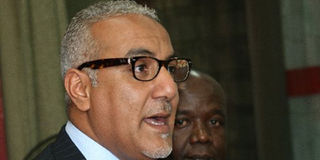Balala asked Sh80m bribe to buy house, Cortec says

Analysts have warned that Mr Balala’s action to revoke mining licences of the affected firms may cause a stand-off between the government and investors in the industry, thereby derailing activity in the mining sector. Photo/JENNIFER MUIRURI |FILE
What you need to know:
- Through Mr Jacob Juma, Cortec Mining Kenya country boss, firm claims Secretary demanded the cash in exchange for the firm keeping its licence
A company whose licence was cancelled on Monday has sensationally accused Mining Secretary Najib Balala of demanding Sh80 million bribe in exchange for the firm keeping its permit.
In a letter dated July 29, this year, written by Cortec Mining Kenya to the Ethics and Anti-Corruption Commission (EACC) of Kenya, the firm accuses Mr Balala of demanding the money to aid him buy a house to replace his Karen one which he is said to have sold to raise funds for campaign during the last General Election.
“On July 8, Mr Juma drove into Mr Balala’s house at 7:30pm where he found Mr Balala waiting for him as per the appointment through the commissioner of mines. At the said meeting, Mr Balala confirmed to our Jacob Juma, our Kenyan country director, that he required Sh80 million from Cortec Mining Limited to buy a house for he had sold his house in Karen to raise funds for campaign in the just concluded elections,” read part of the letter signed by Cortec managing director David Anderson.
Cortec Mining Kenya has been exploring minerals in Mrima Hills, Kwale County.
Jacob Juma is the controversial businessman associated with Erad Limited, a company that is currently held in a court battle with the National Cereals and Produce Board over a Sh600 million debt. Mr Juma has a substantive shareholding in Cortec Mining Kenya through the company’s two holding firms.
Cortec Mining Kenya is owned 70 per cent by Pacific Wildcat Resources, a publicly listed company at the Toronto Stock Exchange in Canada and 30 per cent by Sterling Securities, a firm registered in the United Kingdom.
On Monday, Mr Balala revoked mining licences of 42 companies on grounds that they were irregularly issued, setting the stage for possible court battles with the affected investors.
Cortec Mining Kenya, the company that is licensed to mine the over $100 billion Niobium and rare earth metal deposits at Mrima Hills in Kwale, South Coast was among the companies whose licences were cancelled.
The government, through the spokesperson of the Presidency Manoah Esipisu requested for about three days to investigate the allegations before issuing an official statement.
Meanwhile, an insider of the EACC told the Saturday Nation that the Cortec letter was indeed received at the antigraft body on July 29, and that investigations were underway, although the commission’s spokesperson noted that he could not confirm the issue yesterday being a public holiday.
In its letter, Cortec managing director David Anderson also said that the company officials met with Justin Muturi, the speaker of the National Assembly where they complained of the Sh80 million bribe demands from Mr Balala and requested him to address the matter though the responsible parliamentary committee.
National Assembly
“On the July 16, we had dinner with the speaker of the National Assembly at the Thai restaurant at the New Stanley Hotel and complained of the Sh80 million bribery demand by the mining minister and requested him to intervene in this bribery demand through the house parliamentary committee that deals with mining,” said Mr Anderson in the letter.
While canceling the 42 licences on Monday, Mr Balala also directed mining companies to give a 21-day notice to his ministry before making any public announcement on findings, in a bid to control a situation where such information may cause a rally in their share valuation at the respective bourses they are listed.
On the day Cortec announced its valuation of the rare earth metal resources at the Mrima Hills late last month, Pacific Wildcat Resources’ share which trades at the Toronto Stock Exchange gained 28 per cent.
The Pacific Wildcat Share was suspended from trading on Tuesday at the request of the company and resumed trading on Thursday where it shed 59 per cent of its value following news of licence cancellation.
Besides the bribe allegations, Cortec Mining Kenya has accused Mr Balala of having interest in awarding the mining licence for rare earth metals and niobium to Chinese investors.
In an earlier telephone interview with the Nation, Mr Balala admitted that he indeed travelled to China and met Chinese investors but dismissed the allegation that he was fronting for the investors.
“Yes I was in China recently and the president will be in China next week. Chinese are investors like any other and they have a right to do business in the country,” he said.
Though found in other countries, the market for rare earth metals, that are used in manufacturing electronic gadgets such as smartphones is about 90 per cent controlled by China.
Stand-off
Analysts have warned that Mr Balala’s action to revoke mining licences of the affected firms may cause a stand-off between the government and investors in the industry, thereby derailing activity in the mining sector.
The Kenya Chamber of Mines on Tuesday, through its chairman Adiel Gitari said that Mr Balala’s action went against the spirit of collaboration between the government and industry players.




